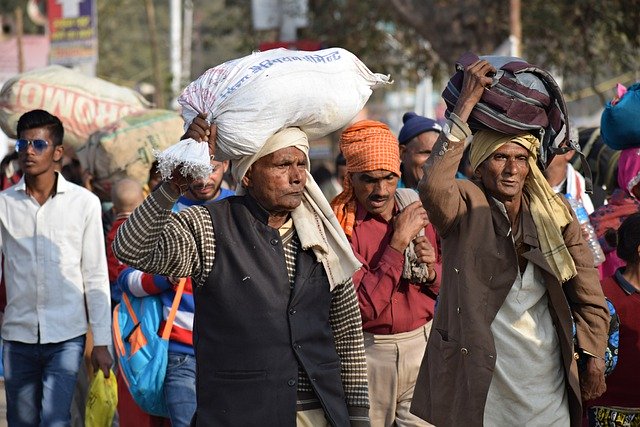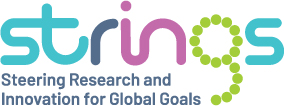Saurabh Arora and Divya Sharma
This blog was originally published on the STEPS Centre blog.
Responses by governments to the COVID-19 pandemic around the world reveal how poverty is produced by social power. The pandemic points, in particular, to the culpability of power exercised through the state.
Consider the Indian government’s top-down lockdown imposed on 24th March 2020. Arguably “the world’s strictest lockdown”, it is producing widespread impoverishment through mass unemployment, leading to hunger and hardship for millions. Livelihoods carefully built over many years by people are being destroyed. Hard-earned dignity is being compromised by desperate poverty produced through diktats of the state.
Many observers in India have noted that some of the immediate suffering produced by the lockdown could have been avoided. The chaotic lockdown is marked by police violence (against street vendors and migrant workers) as well as a lack of responsibility and accountability. The national government, it seems, was unprepared for the effects of its own response to the pandemic. A relief package, announced two days after the lockdown’s imposition, has proven inadequate. It is failing to reach many of those who need it.

Vulnerable people are being pushed into poverty in other parts of the world too. In Nigeria, millions of people are going hungry under the government’s lockdown restrictions. A CNN journalist reporting from Nigeria points to a “battle of lives against livelihoods”, constructing a false dichotomy. One wonders if this language might help to justify the pushing of millions into poverty by a single stroke of state power.
Is a responsible approach to the pandemic really beyond the reach of governments, particularly in post-colonial countries such as India and Nigeria? Why was Taiwan’s successful strategy of early screening of arrivals from Wuhan and home quarantining (with diligent public support) not considered a viable one? What role did the World Health Organisation and global geopolitics play in this marginalisation of Taiwan’s success?
Closer to home, we must also ask why there was no learning based on the experience with COVID-19 in the Indian state of Kerala and with Ebola in West Africa long before that. Can’t governments respond by collaborating with local communities and civil society organisations to tackle the pandemic, while protecting livelihoods and ensuring that nobody goes hungry or homeless? The answer is obviously yes, if they so desire. In India for sure, the government has access to plenty of stockpiled food and money to fend off immediate impoverishment.
As governments around the world mimic each other in imposing one-size-fits-all lockdowns, the pandemic itself is producing different effects for different groups of people, in different settings. It is likely to push vulnerable people into poverty. It is already disproportionately affecting people who have been historically oppressed across intersecting racial, gendered, class, caste, religious, and ‘ethnic’ hierarchies. COVID-19 data from many parts of the USA show that African Americans have been infected and killed at a far higher rate than the rest of the population. In the US state of Louisiana for example, Black people constitute 60% of the deaths associated with COVID-19, while forming only 33% of the state’s population.
Hidden in plain sight
The ways that power produces poverty, so clearly foregrounded by the pandemic, can go unnoticed in ‘normal’ life. Power can produce poverty while being deeply embedded in and normalised through everyday practices. As a result, poverty is generally approached as a ‘state of being poor’. How people are made poor by power is easily overlooked.
How does this happen? Power gets normalised through state institutions, for example law enforcement, and through cultural institutions like caste and patriarchy. This institutionalised power can lead to the exclusion of women and marginalised peoples from rights to land and other resources, alongside everyday indignities.
The kind of power that produces poverty can manifest itself as capital. Capital exploits resources and labour to generate short-term profit at the expense of environmental integrity and public health. And damage done to the environment and public health often disproportionately harms people who are socially marginalised. One extension of this power is in the form of modern technological progress that deskills or displaces workers. Not only does this kind of progress disrupt livelihoods, it can also force people to migrate in search of employment.
But this power, and the ways that it works, isn’t always obvious. Ironically, it can be hidden from view by the economic knowledge about poverty itself, generated by academic and other elite observers. This kind of knowledge obscures power when it frames people as individuals characterised by ‘deficiencies’, without any recognition of (oppressive) relations they are embedded in. Individualized people are then seen as falling into or out of poverty that may be measured using multi-dimensional indicators. The question of how social power produces poverty is put aside.
Consider the hugely influential research by the 2019 Nobel Prize-winning economists. In Banerjee and Duflo’s classic 2012 book, Poor Economics, the term ‘power’ is used many times (yet never explicitly conceptualised). They mostly use power in conjunction with ‘empowerment’ to act. It is thus invoked to highlight the agency of a range of actors including politicians and ‘the poor’. But not once is power considered to produce poverty in society. Not once is the term used to point to the many pressures on the agency of people as they go about building their livelihoods and struggling for justice.
Agency against power
In emphasising how power produces poverty, it is crucial to not treat impoverished people as hapless victims. People have agency. They try to escape the fields of power. They struggle against power. And they work against social marginalisation.
In such performances of individual and collective agency, people (or groups of people) do not act by themselves. Instead, they are enabled by webs of relations with non-hierarchical ‘life forces’: their friends and family, moral values, healing rituals, lands, animals, trees, crops, water bodies, learnt skills and knowledges. Some representatives of the state, such as policies and officials, may also be mobilised into such webs of life forces that enable agency. When this happens, policies and officials work with vulnerable people, weakening the grip of state power that might otherwise produce poverty (as discussed above).
In our own research, through life histories with elderly residents of two villages in Tamil Nadu, we have documented a wide range of ways that different ‘life forces’ offer support to people. By living within webs of such life forces, people enable themselves and each other to act – to exercise their agency.
Examples of people’s agency include a successful campaign by a group of women to tackle men’s consumption of alcohol and abusive behaviour in public spaces (and inside homes), which led to the closure of a village alcohol shop. The women used petitions, concern for small children at a primary school near the shop, and pressure on the men involved to behave appropriately in public places. In using these ‘life forces’, they were able to mount an effective resistance against patriarchal and commercial power.
In these villages, many people have painstakingly built and sustained their livelihoods around multiple forms of work. One person worked as a farm labourer, while also cleaning the kitchen and washing dishes at her village’s milk sale centre. In addition, she made a bit of money as a spiritual healer, primarily focused on warding off the ‘evil eye’. She had also jumped through hoops of bureaucracy and corruption to secure her small old-age pension. This agency to build her livelihood was enabled by a wide range of ‘life forces’, including a middleman who had helped her secure the pension, local beliefs underpinning the practice of ‘the evil eye’, materials such as turmeric, lime, a small pot-like vessel, and water, a range of utensils for milk measurement, and so on.
It is these kinds of carefully assembled livelihoods, representing individual and collective agency accumulated over several years, which are at stake under callous lockdowns. Yet people continue to experiment, resist and escape from the clutches of power that is producing impoverishment. For example, migrant workers are demanding to be taken back home to their villages, rather than staying stuck in cities without jobs, food or family support. Right to food activists are calling for a universalisation of India’s public distribution system.
Multiple civil society initiatives are afoot, to alleviate hunger and hardship. Examples include university students and staff cooking for the hungry; neighbours helping care for disabled people; local non-governmental organisations delivering cash and essential goods to marginalised sex workers; and community radio providing information about procuring food and medicines.
Clearly these forms of agency to care for the vulnerable, and to struggle against impoverishment, will be carried over to the other side of the pandemic and lockdowns. After this intense period of impoverishment, it is crucial to nurture impoverished people’s agency to counter power. It is on such forms of agency that the sustainability of our shared futures depends.

Leave A Comment